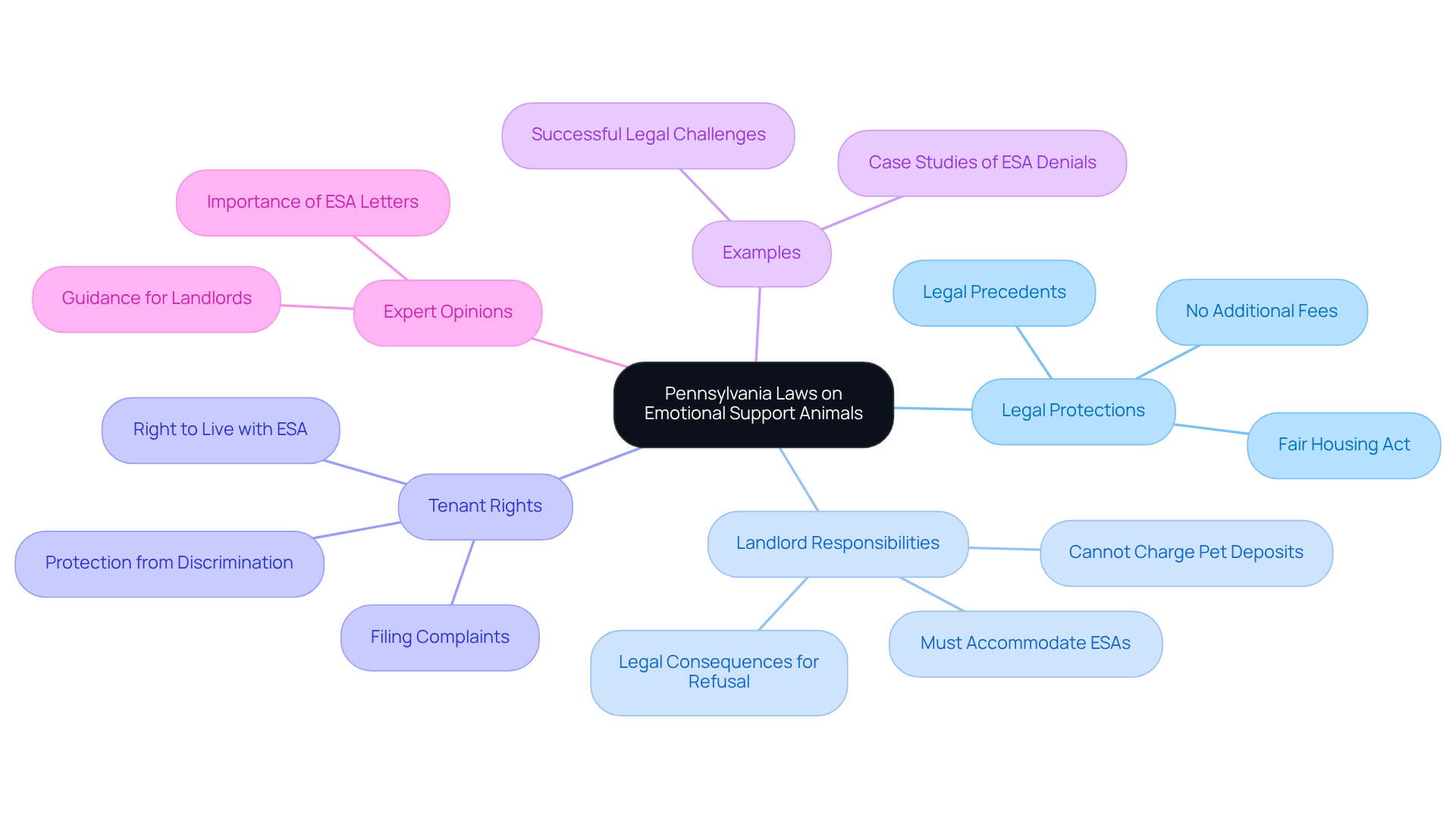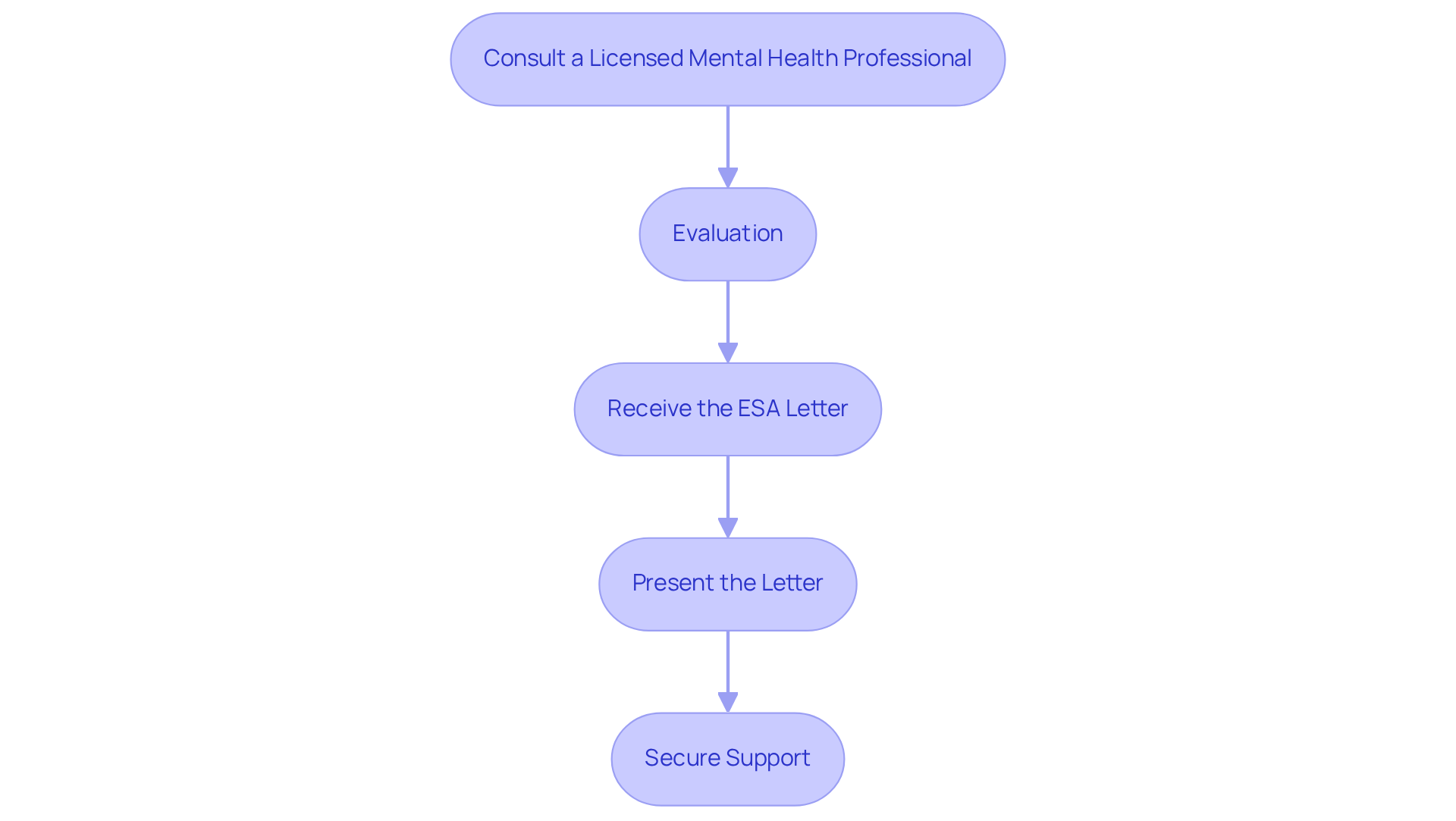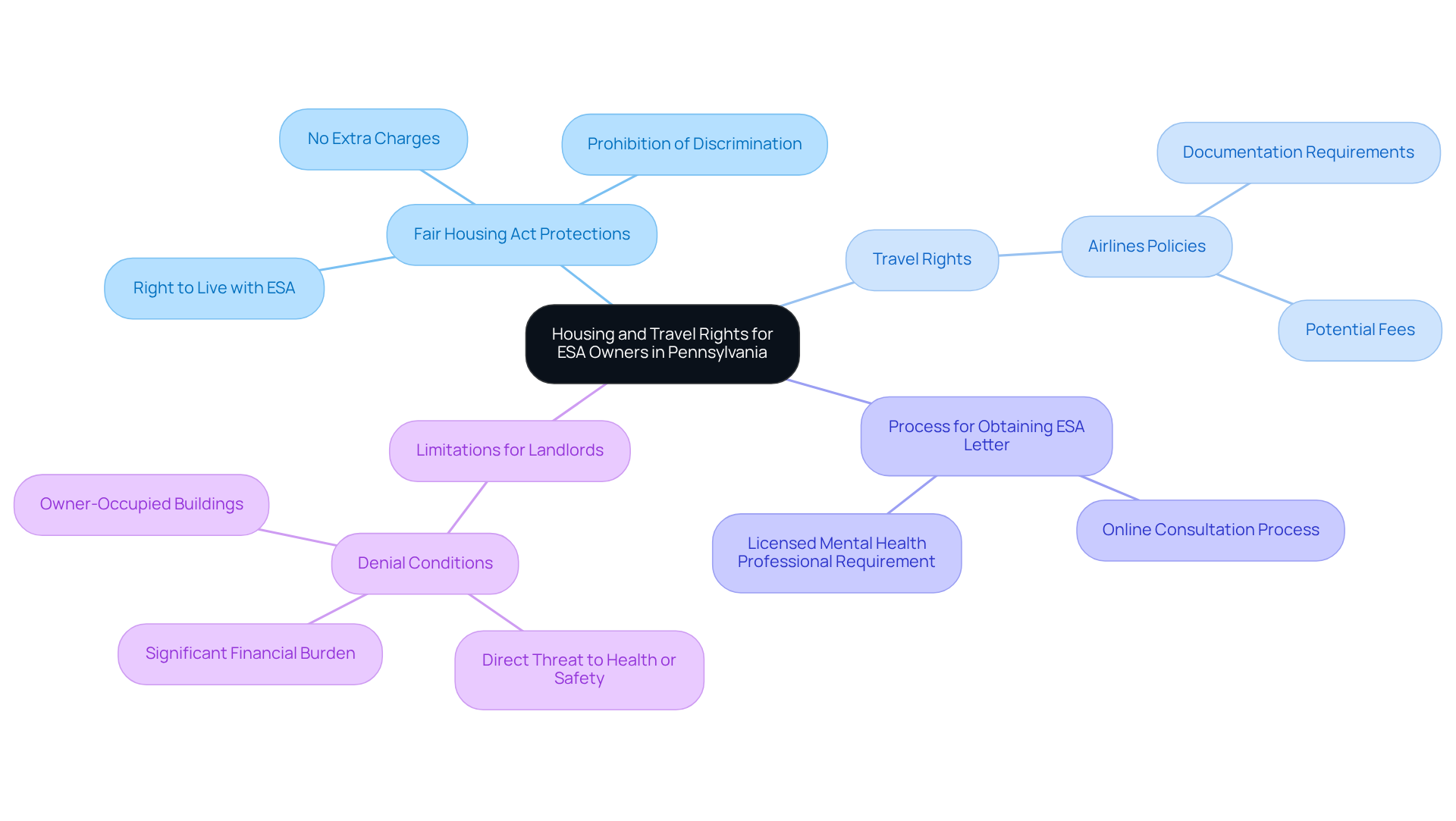

Understanding Pennsylvania Emotional Support Animal Laws for Professionals
by Lena Park
Last updated: August 30, 2025
Verified and Approved by:
Angela Morris,
MSW, LCSW
Fact Checked

Overview
This article highlights the legal status and protections surrounding Emotional Support Animals (ESAs) in Pennsylvania, shedding light on their vital role in housing rights. It acknowledges the emotional struggles individuals with mental health issues face, particularly when it comes to finding safe and supportive living environments.
Pennsylvania’s emotional support animal laws, in alignment with the Fair Housing Act, play a crucial part in safeguarding individuals with ESAs from discrimination in housing situations. These laws not only prohibit landlords from imposing additional fees but also enhance the quality of life for those who rely on these beloved companions for essential support.
By ensuring access to such support, we can foster a nurturing environment that acknowledges the profound bond between individuals and their ESAs.
Introduction
Navigating the legal landscape surrounding Emotional Support Animals (ESAs) can be a daunting task for individuals seeking comfort and for the professionals who assist them. In Pennsylvania, these animals not only offer essential emotional support but also come with specific legal protections that allow their owners to live and travel with greater ease.
Yet, the distinction between ESAs and service animals often leads to confusion, raising important questions about rights, responsibilities, and the process of obtaining necessary documentation.
How can individuals effectively navigate these laws to secure the support they need, while also avoiding potential legal pitfalls? This journey can feel overwhelming, but understanding the available resources can provide a pathway to the relief and companionship that ESAs offer.
Define Emotional Support Animals and Their Legal Status in Pennsylvania
Emotional Support Animals play a vital role in providing comfort and assistance to individuals grappling with emotional or psychological challenges. Unlike service animals, these companions do not require specialized training to perform specific tasks, making them accessible to many who need support. In Pennsylvania, the Fair Housing Act (FHA) recognizes emotional support animals, which is in line with Pennsylvania emotional support animal laws, safeguarding the rights of individuals with disabilities to have their beloved companions in housing situations, even in places that typically prohibit pets.
This legal acknowledgment is essential for professionals to understand, as it directly impacts their clients’ rights and accommodations in various environments. Under the FHA, landlords are prohibited from imposing pet fees or deposits for emotional support animals, ensuring that those with emotional needs can secure housing without financial burdens. Moreover, the FHA protects renters against discrimination based on their emotional support animals, emphasizing the importance of understanding Pennsylvania emotional support animal laws in the context of mental health care.
Reflecting on the challenges faced by individuals with mental health issues, it becomes clear how crucial it is to have supportive companions. Emotional support animals can significantly enhance the quality of life for many, providing not just companionship, but also a sense of security and comfort. As we navigate these complex emotional landscapes, it’s reassuring to know that there are protections in place to help individuals access the support they need.

Explore Pennsylvania Laws Regarding Emotional Support Animals
In Pennsylvania, individuals facing emotional challenges often encounter difficulties in securing housing. Emotional assistance animals (ESAs) are primarily governed by the Fair Housing Act and the Pennsylvania emotional support animal laws, which provide essential protections for individuals with valid ESA letters. The Pennsylvania emotional support animal laws ensure that individuals cannot be denied housing due to pet restrictions, allowing them to live alongside their emotional support companions. Importantly, landlords are prohibited from charging additional fees or deposits for emotional support animals, a significant relief for renters navigating housing obstacles. This means that standard pet deposits cannot be imposed, further safeguarding tenants’ interests.
However, it’s crucial to recognize that while emotional support animals enjoy specific protections under Pennsylvania emotional support animal laws in housing, they do not possess the same public access rights as service animals. This distinction is vital for professionals who guide clients in understanding their rights and responsibilities regarding ESAs. For example, a tenant with an ESA letter may challenge a landlord’s refusal to accommodate their animal, particularly if such a refusal contravenes the FHA. Legal precedents indicate that landlords could incur fines of up to $75,000 for unlawfully denying an ESA, emphasizing the importance of compliance with Pennsylvania emotional support animal laws.
Real-world examples further illustrate the impact of these laws. In one case, a tenant lodged a complaint against a landlord who denied their ESA request, leading to a legal ruling that reinforced the tenant’s protections under the FHA. Such instances underscore the necessity for both tenants and landlords to be well-informed about Pennsylvania emotional support animal laws to prevent potential legal conflicts. Additionally, it is important to remember that only licensed mental health professionals can evaluate the need for an ESA in compliance with Pennsylvania emotional support animal laws, ensuring that the process of obtaining an ESA letter is both legitimate and lawful.
Expert opinions stress that grasping the intricacies of ESA regulations is essential for professionals in the field. As the landscape of emotional assistance animal regulations continues to evolve, staying informed about legal obligations and protections will empower professionals to effectively advocate for their clients’ rights.

Outline the Process for Obtaining an ESA Letter in Pennsylvania
Obtaining an ESA letter in Pennsylvania can feel like a daunting task, especially when navigating the emotional challenges that come with mental health struggles under Pennsylvania emotional support animal laws. However, by following these essential steps, you can find the support you need.
-
Consult a Licensed Mental Health Professional (LMHP): Begin by scheduling an appointment with a licensed therapist or psychiatrist who can truly understand your mental health needs. This initial step is crucial in addressing your emotional well-being.
-
Evaluation: During your consultation, take the opportunity to openly discuss your emotional or psychological challenges. Share how an Emotional Support Animal (ESA) could provide the comfort and assistance you seek. This conversation is a safe space for you to express your feelings and needs.
-
Receive the ESA Letter: If your LMHP determines that an ESA is appropriate for you, they will issue a letter confirming your need for one as part of your treatment plan. Ensure that this letter is on official letterhead and includes the professional’s license number, as it is vital for your next steps.
-
Present the Letter: With your ESA letter in hand, you can confidently request reasonable accommodations from landlords or housing providers. This letter serves as your advocate, helping you secure the support you deserve.
By following these steps, you can ensure that you have the necessary documentation to effectively advocate for your rights in accordance with Pennsylvania emotional support animal laws. Typically, clients can expect to receive their ESA letter within 24 hours after approval, streamlining the process for those in need of emotional support. Remember, you are not alone on this journey; support is available to help you through.

Examine Housing and Travel Rights for ESA Owners in Pennsylvania
In Pennsylvania, many individuals face emotional challenges that can feel overwhelming. Fortunately, the Pennsylvania emotional support animal laws provide specific protections for owners of Emotional Support Animals (ESAs) under the Fair Housing Act, which requires landlords to permit them to live in properties that generally ban pets. This means that landlords are obligated to provide reasonable adjustments, ensuring that no extra charges or deposits are imposed for emotional support animals.
However, it is important to recognize that emotional support animals do not possess the same public access privileges as service animals. For travel, while the Air Carrier Access Act does not require airlines to accommodate emotional support animals, some airlines may allow them if proper documentation is provided. Understanding these rights is crucial for professionals representing clients, as it ensures they obtain the necessary assistance and accommodations.
Notably, approximately 18% of pet owners in the U.S. have ESAs, reflecting a growing recognition of their mental health benefits. The Fair Housing Act also prohibits discrimination against individuals with disabilities, and according to Pennsylvania emotional support animal laws, ESA owners can live in rental housing without facing eviction or rejection based solely on their ESA status.
Landlords can only deny ESA requests under specific limitations, such as significant financial burdens or if the property is an owner-occupied building with fewer than four units. To facilitate the process of obtaining a legitimate ESA letter, Wellness Wag offers a streamlined online platform where individuals can consult with licensed medical physicians. After submitting the required forms, clients are linked with a medical doctor for a personalized consultation, ensuring they receive a professionally crafted ESA letter with legal recognition within 24 hours.
Wellness Wag’s services are accessible nationwide, making it easier for individuals across the country to obtain the support they need. As stated by the U.S. Department of Justice, ‘The Fair Housing Act mandates reasonable accommodations for individuals with disabilities, ensuring their rights are protected.’ This compassionate approach helps individuals navigate their rights and find the support that can make a meaningful difference in their lives.

Conclusion
Understanding the intricacies of Pennsylvania’s emotional support animal laws is crucial for professionals who assist individuals facing emotional challenges. These laws not only acknowledge the importance of emotional support animals in enhancing mental well-being but also provide essential protections that allow individuals to live alongside their companions without encountering discrimination or financial burdens.
Many individuals struggle with mental health issues, feeling isolated and overwhelmed. The legal framework surrounding emotional support animals, including the Fair Housing Act’s provisions, plays a vital role in alleviating these burdens. It prevents landlords from imposing pet fees and enables tenants to secure housing with their ESAs. Obtaining a legitimate ESA letter from licensed mental health professionals is essential, ensuring compliance with regulations and providing the support needed.
It’s important to clarify the distinction between emotional support animals and service animals, as each comes with specific rights and limitations. Understanding these differences can empower individuals to advocate for themselves and their needs.
Ultimately, the significance of understanding Pennsylvania’s emotional support animal laws cannot be overstated. As the landscape of mental health support evolves, it is essential for professionals to remain informed to advocate effectively for their clients. By doing so, they can help individuals access the emotional support they need, reinforcing the vital role that these animals play in enhancing quality of life and fostering a sense of security.
Imagine the comfort and companionship an emotional support animal can provide during difficult times. With the right knowledge and resources, individuals can navigate their emotional journeys with greater ease, supported by the loving presence of their ESAs.
Frequently Asked Questions
What are Emotional Support Animals (ESAs)?
Emotional Support Animals are companions that provide comfort and assistance to individuals dealing with emotional or psychological challenges. Unlike service animals, they do not require specialized training to perform specific tasks.
What is the legal status of Emotional Support Animals in Pennsylvania?
In Pennsylvania, the Fair Housing Act (FHA) recognizes Emotional Support Animals, allowing individuals with disabilities to have their ESAs in housing situations, even in places that typically prohibit pets.
What rights do individuals have regarding Emotional Support Animals under the Fair Housing Act?
Under the FHA, landlords cannot impose pet fees or deposits for Emotional Support Animals, and renters are protected against discrimination based on their ESAs.
Why is it important for professionals to understand Pennsylvania’s emotional support animal laws?
Understanding these laws is crucial for professionals as it directly impacts their clients’ rights and accommodations in various environments, particularly in housing situations.
How do Emotional Support Animals enhance the quality of life for individuals with mental health issues?
Emotional Support Animals provide companionship, a sense of security, and comfort, significantly improving the quality of life for many individuals facing mental health challenges.
Certify Your Emotional Support Animal Today

Why You Can Rely on Us?
At Wellness Wag, we believe your pet deserves care rooted in both science and compassion. Each article is carefully researched, written in clear language for pet owners, and then reviewed by qualified professionals to ensure the information is evidence-based, current, and practical for real-life care. Our goal is to help you feel confident in making informed decisions about your pet’s health and well-being.
Reviewed by
Angela Morris, MSW, LCSW
Angela is a licensed clinical social worker with 20 years of experience in patient advocacy and community mental health. She has assisted numerous clients with ESA evaluations and brings a deep understanding of disability accommodations, ensuring that all information is accurate, supportive, and practical.

Written by :
Lena Park
Last Updated :
August 30, 2025












